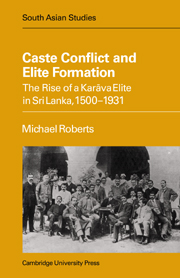Book contents
- Frontmatter
- Contents
- List of figures, chart and maps
- List of tables
- Preface
- Glossary
- List of abbreviations
- Map 1 The Kingdoms of Kotte and Kandy
- Map 2 Some physical features and place names
- Map 3 Present administrative divisions and the contemporary migration patterns of fishermen
- Map 4 The coastal waters of Sri Lanka and southeastern India
- 1 Introduction
- 2 The Karāva in the past
- 3 Caste among the Sinhalese
- 4 Economic opportunities and social relations, 1500s–1790s
- 5 The British period: the economic advances of a Karāva elite
- 6 Social competition, caste conflict and manifestations of Karāva power
- 7 Casteism in South Asian politics during British times: emergent cultural typifications or elite fictions?
- 8 Causal factors in the moulding of Karāva entrepreneurship and the emergence of a Karāva elite
- 9 Concluding remarks
- Tables
- Appendix 1 Problems and cautionary notes concerning the information derived from the plantation directories in the sequential series known as Ferguson's Ceylon Directory
- Appendix 2 A contemporary newspaper account of the reception provided for a Karāva notable on his receiving the title of ‘Mudaliyar of the Governor's Gate’ in 1853
- Appendix 3 A list of caste pamphlets and caste literature in chronological order, 1864–1930
- Select bibliography
- Index
9 - Concluding remarks
Published online by Cambridge University Press: 30 October 2009
- Frontmatter
- Contents
- List of figures, chart and maps
- List of tables
- Preface
- Glossary
- List of abbreviations
- Map 1 The Kingdoms of Kotte and Kandy
- Map 2 Some physical features and place names
- Map 3 Present administrative divisions and the contemporary migration patterns of fishermen
- Map 4 The coastal waters of Sri Lanka and southeastern India
- 1 Introduction
- 2 The Karāva in the past
- 3 Caste among the Sinhalese
- 4 Economic opportunities and social relations, 1500s–1790s
- 5 The British period: the economic advances of a Karāva elite
- 6 Social competition, caste conflict and manifestations of Karāva power
- 7 Casteism in South Asian politics during British times: emergent cultural typifications or elite fictions?
- 8 Causal factors in the moulding of Karāva entrepreneurship and the emergence of a Karāva elite
- 9 Concluding remarks
- Tables
- Appendix 1 Problems and cautionary notes concerning the information derived from the plantation directories in the sequential series known as Ferguson's Ceylon Directory
- Appendix 2 A contemporary newspaper account of the reception provided for a Karāva notable on his receiving the title of ‘Mudaliyar of the Governor's Gate’ in 1853
- Appendix 3 A list of caste pamphlets and caste literature in chronological order, 1864–1930
- Select bibliography
- Index
Summary
In employing a series of controlled comparisons in the previous chapter, it was necessary to consider several factors to which, eventually, little weight could be attached as contributory causes for the economic success of the Karāva elite. Without altogether jettisoning the eclectic approach which has been favoured so far, in this chapter I propose to sharpen my lines of discriminatory emphasis and to distinguish the more vital factors, and thereafter to dwell upon some of the implications arising from these factors. Assigning weightages in this fashion is ultimately intuitive. This is all the more so when, as the previous sections should have made clear, some of the reasoning is constructed upon speculative foundations. The assessment must also operate within the constraints of a research design which has focused on channels of upward social mobility. For a fuller understanding of the processes of elite formation it would be useful to have similar information on families that experienced downward mobility. A priori it is possible that the advent of the Western colonial powers or the penetration of capitalism may have had depressive effects on certain sectors of the indigenous economy. The emergence of a new economic elite in a locality may have been rendered possible by the decline of certain local elites who were adversely affected by such processes. It is without the benefits of such finely grained local and regional histories that this concluding survey is attempted.
- Type
- Chapter
- Information
- Caste Conflict Elite Formation , pp. 283 - 294Publisher: Cambridge University PressPrint publication year: 1982



